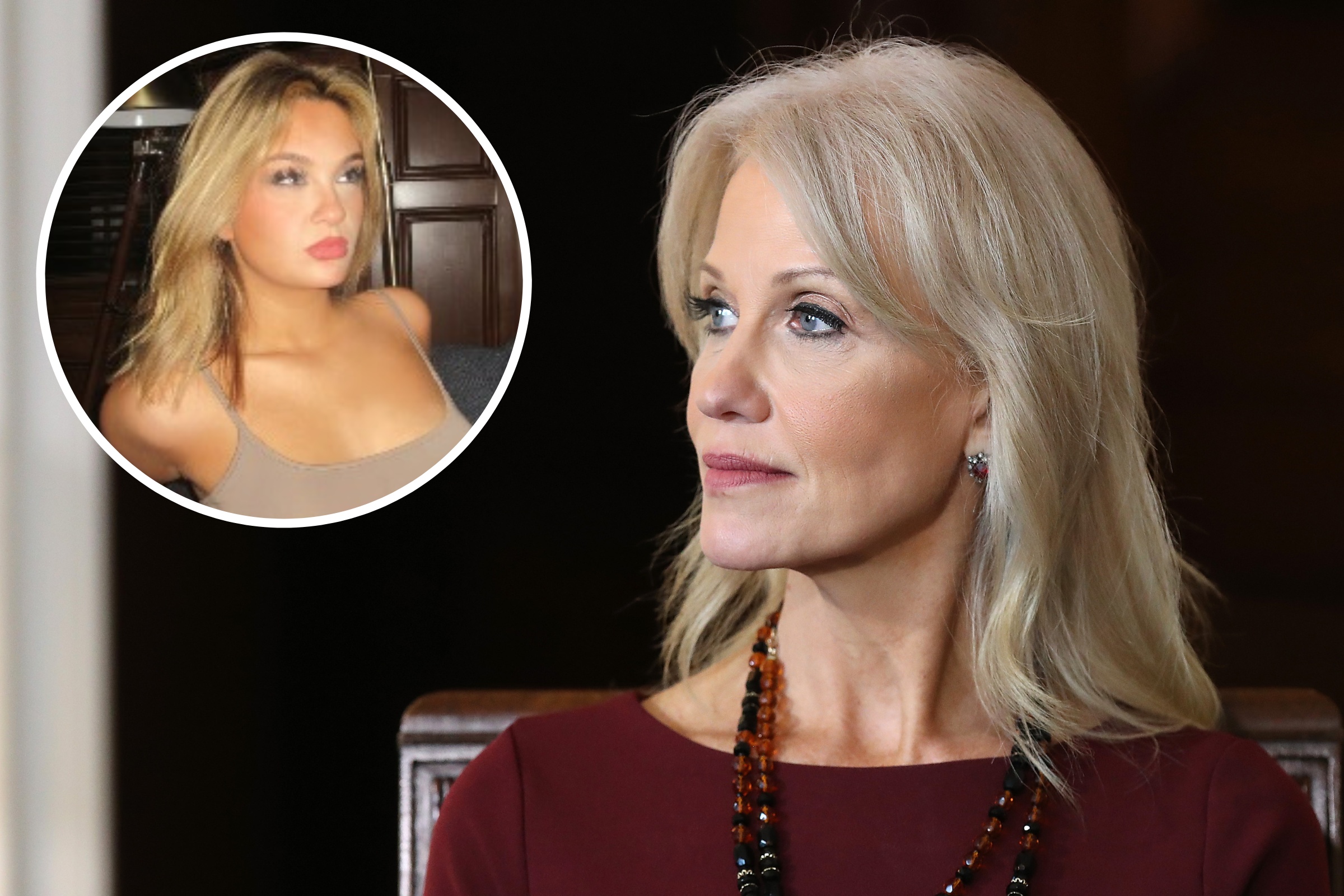Kelleyanne Conway Nude: The Truth Behind The Controversy And Misinformation
Let’s just dive right into it, folks. Kelleyanne Conway has been a polarizing figure in American politics for years, and recently, her name has surfaced again—but this time, it’s not about politics. The internet is buzzing with claims and rumors about “Kelleyanne Conway nude.” But hold up, before you click away or assume the worst, let’s break it down. This isn’t just another sensational headline; it’s a deep dive into the facts, the fiction, and the importance of responsible media consumption.
In today’s digital age, where misinformation spreads faster than wildfire, it’s crucial to separate fact from fiction. The internet is filled with clickbait headlines that prey on our curiosity, and the phrase “Kelleyanne Conway nude” is no exception. So, why are people talking about it? Is there any truth to these claims? Or is it just another case of fake news gone viral? We’ll get to that, but first, let’s set the stage.
Kelleyanne Conway, a former counselor to President Donald Trump, has always been at the center of political storms. Her sharp wit, outspoken nature, and controversial statements have made her a household name. But now, her name is being dragged into something far more personal—a topic that deserves careful scrutiny and respect. In this article, we’ll explore the backstory, the facts, and why it’s essential to approach such claims with a critical eye.
Who Is Kelleyanne Conway? A Quick Bio
Before we dive into the controversy, let’s take a step back and get to know Kelleyanne Conway. Below is a quick rundown of her life, career, and achievements:
| Full Name | Kellyanne Elizabeth Conway |
|---|---|
| Date of Birth | December 8, 1967 |
| Place of Birth | Fort Monmouth, New Jersey, USA |
| Profession | Political Consultant, Author, Former Counselor to the President |
| Education | Bachelor’s Degree in Political Science from The Catholic University of America |
| Family | Married to George Conway (Divorced in 2020), Three Children |
Kelleyanne Conway’s career in politics began long before she became a household name during the Trump administration. She’s a seasoned political strategist, a best-selling author, and a trailblazer in the world of public relations. But her personal life has often been under scrutiny, and this latest rumor is just another chapter in that story.
The Rumor Mill: What’s the Story Behind Kelleyanne Conway Nude?
Now, let’s talk about the elephant in the room. The phrase “Kelleyanne Conway nude” has been circulating online, and it’s been causing quite a stir. But what’s the truth behind it? Is there any real evidence to support these claims, or is it just another case of fake news spreading like wildfire?
Here’s the deal: there is no credible evidence to suggest that Kelleyanne Conway has ever released or been involved in any explicit content. The rumors likely stem from a combination of misinformation, clickbait headlines, and the internet’s insatiable appetite for scandal. In fact, Kelleyanne herself has repeatedly denied any involvement in such content, and there’s no reason to doubt her word.
So, why does this rumor persist? Well, it’s simple: people love drama. And when it comes to public figures, especially those in politics, the line between fact and fiction often gets blurred. But as responsible consumers of information, it’s our job to verify the facts before jumping to conclusions.
Why This Matters: The Impact of Misinformation
Misinformation isn’t just harmless gossip; it has real-world consequences. When false claims about someone’s personal life spread online, it can damage their reputation, invade their privacy, and even lead to harassment. Kelleyanne Conway is no stranger to criticism, but this particular rumor goes beyond politics and enters the realm of personal invasion.
Here are a few reasons why this matters:
- Privacy Invasion: Everyone deserves the right to privacy, regardless of their public status. Spreading rumors about someone’s personal life without evidence is a violation of that right.
- Reputation Damage: False claims can tarnish someone’s reputation, affecting their professional and personal life.
- Public Responsibility: As consumers of information, we have a responsibility to verify the facts before sharing or believing anything online.
So, the next time you come across a sensational headline, take a step back and ask yourself: is this really true? Or is it just another case of clickbait designed to grab your attention?
How to Spot Fake News: Tips for Responsible Media Consumption
In a world where misinformation runs rampant, it’s more important than ever to be a critical consumer of information. Here are a few tips to help you spot fake news and avoid falling for sensational headlines:
1. Check the Source
Is the website or publication reputable? If you’ve never heard of it before, do some research to find out more. Reputable sources like Reuters, BBC, or The New York Times are generally trustworthy, but even they can make mistakes, so always double-check.
2. Look for Evidence
Does the article provide credible evidence to support its claims? Are there quotes, data, or expert opinions backing up the story? If not, it’s probably not worth believing.
3. Be Skeptical of Sensational Headlines
If a headline sounds too outrageous to be true, it probably is. Sensational headlines are designed to grab your attention, but they often lack substance. Always read the full article before sharing or believing anything.
4. Cross-Check with Other Sources
Don’t rely on just one source for information. Check multiple reputable sources to see if they’re reporting the same story. If no one else is talking about it, chances are it’s not true.
The Role of Social Media in Spreading Misinformation
Social media platforms like Twitter, Facebook, and Instagram have made it easier than ever to share information—but they’ve also made it easier to spread misinformation. With the click of a button, a false claim can reach millions of people in seconds. And once it’s out there, it’s hard to contain.
Here’s how social media contributes to the spread of misinformation:
- Algorithm Bias: Social media algorithms are designed to show users content that aligns with their interests and beliefs, which can create echo chambers where false information spreads unchecked.
- Lack of Fact-Checking: Many social media platforms don’t have robust fact-checking mechanisms in place, allowing false claims to go viral before they’re debunked.
- Emotional Triggers: Sensational headlines often play on people’s emotions, making them more likely to share without verifying the facts.
As users, we have a responsibility to be more mindful of what we share online. Before hitting that “share” button, take a moment to verify the facts. Your actions can make a difference in the fight against misinformation.
Kelleyanne Conway’s Career: A Look Back at Her Accomplishments
While the rumors about Kelleyanne Conway nude may dominate the headlines, it’s important to remember that she’s more than just a political figure. She’s a trailblazer in the world of public relations and politics, with a long list of accomplishments to her name.
Here are a few highlights from her career:
- First Woman to Receive the “Pollie Award”: In 2003, Kelleyanne became the first woman to win the prestigious Pollie Award for her work in political advertising.
- Author of Best-Selling Books: She’s written several books, including “The Trump Phenomenon: The Inside Story of a Transformative Presidency,” which became a best-seller.
- Key Player in the Trump Campaign: As the campaign manager for Donald Trump’s 2016 presidential campaign, Kelleyanne played a crucial role in his victory.
Despite the controversies surrounding her political career, Kelleyanne Conway has made a significant impact in the world of politics and public relations. Her achievements deserve recognition, even if her personal life remains a topic of debate.
Legal Implications: What Happens When Rumors Go Too Far?
Spreading false information about someone’s personal life isn’t just unethical—it can also have legal consequences. In many countries, spreading rumors or defamatory statements can result in lawsuits, fines, or even imprisonment. So, if you’re thinking about sharing that sensational headline, think twice.
Here’s what you need to know:
- Defamation Laws: Defamation laws protect individuals from false statements that harm their reputation. If someone can prove that a false claim has damaged their reputation, they may be able to sue for damages.
- Privacy Rights: Everyone has the right to privacy, and invading someone’s personal life without consent can lead to legal action.
- Social Media Liability: Social media platforms can also be held liable for spreading false information, especially if they fail to remove harmful content after being notified.
So, the next time you come across a sensational headline, ask yourself: is this worth risking someone’s reputation over? Chances are, it’s not.
The Importance of Critical Thinking in the Digital Age
In today’s digital age, critical thinking is more important than ever. With so much information at our fingertips, it’s easy to get overwhelmed—and even easier to fall for misinformation. But by developing strong critical thinking skills, we can better navigate the digital landscape and avoid falling for fake news.
Here’s how you can improve your critical thinking skills:
- Ask Questions: Don’t accept everything you read at face value. Ask yourself: who wrote this? What’s their agenda? Where’s the evidence?
- Verify the Facts: Always double-check information before believing or sharing it. Use reputable sources and fact-checking websites like Snopes or FactCheck.org.
- Stay Open-Minded: Be willing to change your opinion if new evidence emerges. Critical thinking isn’t about being right all the time; it’s about being willing to learn and grow.
By developing strong critical thinking skills, we can become better consumers of information—and better citizens of the digital world.
Conclusion: Let’s Be Better Consumers of Information
In conclusion, the rumors about Kelleyanne Conway nude are just another example of how misinformation can spread online. While it’s tempting to click on sensational headlines, it’s important to remember that not everything we read is true. By developing strong critical thinking skills and being mindful of what we share online, we can help combat the spread of fake news and protect the reputations of those involved.
So, the next time you come across a sensational headline, take a step back and ask yourself: is this really true? Or is it just another case of clickbait designed to grab your attention? Your actions can make a difference in the fight against misinformation.
And finally, let’s not forget the importance of respecting people’s privacy and dignity, regardless of their public status. Everyone deserves the right to live their life without having their personal life invaded by false claims and sensational headlines.
Call to Action: Share this article with your friends and family to help spread awareness about the dangers of misinformation. Together, we can make the internet a better, more responsible place.
Table of Contents
- Who Is Kelleyanne Conway? A Quick Bio
- The Rumor Mill: What’s the Story Behind Kelleyanne Conway Nude?
- Why This Matters: The Impact of Misinformation
- How to Spot Fake News: Tips for Responsible Media Consumption
- The Role of Social Media in Spreading Misinformation
- Kelleyanne Conway’s Career: A Look Back at Her Accomplishments
- Legal Implications: What Happens When Rumors Go Too Far?
- The Importance of Critical Thinking in the Digital Age
- Conclusion: Let’s Be Better Consumers of Information

Claudia Conway Nude Apparently Posted To Kellyanne Conway's Twitter

Vanessa Conway

Kellyanne Conway accused of posting nude photo of teen daughter amid